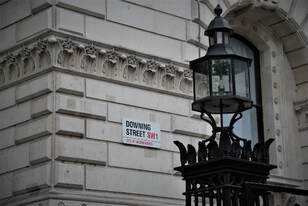 Picture by Jordhan Madec on Unsplash
Picture by Jordhan Madec on Unsplash In 2021, the UK Government is moving to further reduce its aid budget from 0.7% of gross national income (GNI) to 0.5%. Analysis of estimated funding between 2019 and 2022 compared to 2015 to 2018, indicates that gender equality focused programming is severely affected, and women and girls will suffer disproportionately from reductions in funding to critical sectors. The Commonwealth Development Office (FCDO) said these changes are the result of COVID-19’s impact on public finances.
UN agencies’ work hit hard
The UK was the third biggest donor globally in 2020, spending over £14.5bn on international aid. Support to UNAIDS will be reduced from £15 million to £2.5 million. The UK’s expected contribution of £154 million to UNFPA for 2021 will be reduced by 85% to £23 million.
The impact is huge: the UNFPA programme is responsible for 40% of the world’s contraceptives. The executive director of UNFPA Dr. Natalia Kanem estimated the £130 million lost could have helped prevent around 250,000 maternal and child deaths, 14.6 million unintended pregnancies and 4.3 million unsafe abortions. These cuts will also increase the prices of commodities and supplies of contraception globally. Moreover, the cuts come amidst the pandemic that has increased gender inequality and gender-based violence, and severely constraint people’s access to healthcare services.
A blow to IPPF service delivery in multiple countries
The UK cuts will also deal a heavy blow to IPPF’s funding which totals around £72 million. This will result in massive reductions to the UK’s flagship WISH (Women Integrated Sexual Health) and closure of services in 4 countries. Furthermore, the cuts will result in the closure of IPPF’s ACCESS programme in the upcoming 90 days. The ACCESS programme provides in-depth research on specific sexual and reproductive health needs of marginalised communities and has humanitarian settings in Lebanon, Mozambique, Nepal and Uganda and was only 6 months into implementation. Without funding, IPPF will be forced to close services in Afghanistan, Bangladesh, Zambia, Mozambique, Zimbabwe, Ivory Coast, Cameroon, Uganda, Nepal and Lebanon. It also may close services in 9 additional countries, and will withdraw support of SRH services from approximately 4,500 service delivery points globally.
UK no longer a reliable partner
In the year when the UK will host the G7 summit, it is the only G7 country to cut aid. In fact, all of the other G7 countries are increasing their support. These cuts show the UK’s lack of commitments to SRHR in ending preventable deaths, advancing gender equality and getting 40 million more girls in low and middle-income countries into school by 2025. The UK’s sudden rollback on its commitments, and the way the cuts have been managed, has strongly damaged long-term collaborative partnerships and trust between the UK Government and implementing partners, including multilateral agencies and other governments developed over many years, and damaged the UK’s reputation as a reliable partner. When the Trump administration reinstated the Global Gag Rule, the global response under the She Decides, spearheaded by minister De Croo, was immense. Donor countries now need to step up their support for gender equality, and SRHR and HIV particularly, to mitigate this unfolding disaster.
The UK was the third biggest donor globally in 2020, spending over £14.5bn on international aid. Support to UNAIDS will be reduced from £15 million to £2.5 million. The UK’s expected contribution of £154 million to UNFPA for 2021 will be reduced by 85% to £23 million.
The impact is huge: the UNFPA programme is responsible for 40% of the world’s contraceptives. The executive director of UNFPA Dr. Natalia Kanem estimated the £130 million lost could have helped prevent around 250,000 maternal and child deaths, 14.6 million unintended pregnancies and 4.3 million unsafe abortions. These cuts will also increase the prices of commodities and supplies of contraception globally. Moreover, the cuts come amidst the pandemic that has increased gender inequality and gender-based violence, and severely constraint people’s access to healthcare services.
A blow to IPPF service delivery in multiple countries
The UK cuts will also deal a heavy blow to IPPF’s funding which totals around £72 million. This will result in massive reductions to the UK’s flagship WISH (Women Integrated Sexual Health) and closure of services in 4 countries. Furthermore, the cuts will result in the closure of IPPF’s ACCESS programme in the upcoming 90 days. The ACCESS programme provides in-depth research on specific sexual and reproductive health needs of marginalised communities and has humanitarian settings in Lebanon, Mozambique, Nepal and Uganda and was only 6 months into implementation. Without funding, IPPF will be forced to close services in Afghanistan, Bangladesh, Zambia, Mozambique, Zimbabwe, Ivory Coast, Cameroon, Uganda, Nepal and Lebanon. It also may close services in 9 additional countries, and will withdraw support of SRH services from approximately 4,500 service delivery points globally.
UK no longer a reliable partner
In the year when the UK will host the G7 summit, it is the only G7 country to cut aid. In fact, all of the other G7 countries are increasing their support. These cuts show the UK’s lack of commitments to SRHR in ending preventable deaths, advancing gender equality and getting 40 million more girls in low and middle-income countries into school by 2025. The UK’s sudden rollback on its commitments, and the way the cuts have been managed, has strongly damaged long-term collaborative partnerships and trust between the UK Government and implementing partners, including multilateral agencies and other governments developed over many years, and damaged the UK’s reputation as a reliable partner. When the Trump administration reinstated the Global Gag Rule, the global response under the She Decides, spearheaded by minister De Croo, was immense. Donor countries now need to step up their support for gender equality, and SRHR and HIV particularly, to mitigate this unfolding disaster.

 RSS Feed
RSS Feed